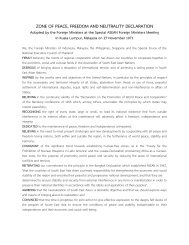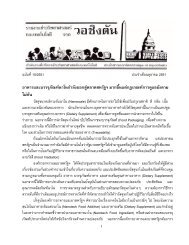You also want an ePaper? Increase the reach of your titles
YUMPU automatically turns print PDFs into web optimized ePapers that Google loves.
December 19, 2011<br />
Language Links is an internal publication of the Devawongse Varopakarn Institute of Foreign Affairs, Office of the Permanent<br />
Secretary, Ministry of Foreign Affairs http://www.mfa.go.th/web/2791.php<br />
There are different ways to <strong>learn</strong>. Find out what kind of <strong>learn</strong>er <strong>you</strong> are in order to<br />
better understand <strong>how</strong> to <strong>learn</strong> more effectively.<br />
The visual <strong>learn</strong>er<br />
Do <strong>you</strong> need to see <strong>you</strong>r teacher during lessons in order to fully understand the content<br />
of a lesson<br />
Do <strong>you</strong> prefer to sit at the front of the classroom to avoid visual obstructions<br />
(e.g. people’s heads)<br />
Do <strong>you</strong> think in pictures and <strong>learn</strong> <strong>best</strong> from visual displays including: diagrams,<br />
illustrated text books, overhead transparencies, videos, flipcharts and hand-outs<br />
During a lecture or classroom discussion, do <strong>you</strong> prefer to take detailed notes to absorb<br />
the information<br />
Learning Tip! - <strong>you</strong> may benefit from taking part in traditional English lessons,<br />
but maybe private lessons would be better.<br />
The auditory <strong>learn</strong>er<br />
<strong>Understanding</strong> <strong>how</strong> <strong>you</strong> <strong>learn</strong> <strong>best</strong><br />
Do <strong>you</strong> <strong>learn</strong> <strong>best</strong> through verbal lectures, discussions, talking things through and<br />
listening to what others have to say<br />
Do <strong>you</strong> interpret the underlying meanings of speech through listening to tone of voice,<br />
pitch, speed and other nuances<br />
Does written information have little meaning until <strong>you</strong> hear it<br />
Learning Tip! - <strong>you</strong> may benefit from listening to the radio or<br />
istening to text as <strong>you</strong> read it. You could try reading text<br />
aloud and using a tape recorder to play it back to <strong>you</strong>rself.<br />
×
2<br />
The Tactile<br />
Country<br />
<strong>learn</strong>er<br />
(Area)<br />
Do <strong>you</strong> <strong>learn</strong> <strong>best</strong> through a hands-on approach, actively exploring the physical world<br />
around <strong>you</strong><br />
Do <strong>you</strong> find it hard to sit still for long periods<br />
Do <strong>you</strong> become distracted easily<br />
Learning Tip! - <strong>you</strong> may benefit from taking an active part in role plays or drama<br />
activities.<br />
Other English Learning Tips<br />
Travel to an English speaking country:-<br />
• England, America, Australia, Canada, South Africa, one of them is only a few<br />
hours away from <strong>you</strong>.<br />
•Specialist holidays are available to improve <strong>you</strong>r English.<br />
•Take an English speaking tour or activity holiday.<br />
Spend <strong>you</strong>r time on things that interest <strong>you</strong>. If <strong>you</strong> like cooking then buy an Englishlanguage<br />
cookbook or find recipes on the net and practise following the recipes. You’ll<br />
soon know if <strong>you</strong> have made a mistake!<br />
Keep something English on <strong>you</strong> (book, newspaper or magazine, cd or cassette, set<br />
of flashcards) all day and every day, <strong>you</strong> never know when <strong>you</strong> might have five spare<br />
minutes.<br />
If <strong>you</strong> are too tired to actively practice just relax and<br />
listen to an English pop song or talk radio station.<br />
Get onto Skype. Start networking with other <strong>learn</strong>ers /<br />
native speakers / teachers (don’t just restrict <strong>you</strong>rself<br />
to seeking out native speakers).<br />
REFERENCE:<br />
http://www.<strong>learn</strong>english.de/improvepage.htm<br />
Usana
3<br />
Q: What is the difference between scared and scary<br />
A: Scared is an adjective used to describe a person or maybe an animal that is<br />
frightened or worried.<br />
For example:<br />
“Hirantha was too scared to go white water kayaking in Sri Lanka.”<br />
“I am really scared about speaking in front of the class.”<br />
“She’s scared to walk alone at night.”<br />
Scary (UK also scarey) is an adjective used to describe something or someone that<br />
causes fear or terror.<br />
For example: “The horror movie was really scary.”<br />
Note! - Just remember “I’m scared of scary things, but I’m not scary.”<br />
http://www.<strong>learn</strong>english.de/mistakes/scared.html<br />
Napassawan
4<br />
Which physical gesture, commonly recognised in the western world as an<br />
affirmative, can be found vulgar and offensive in places such as Russia, the<br />
Middle East and even parts of Greece<br />
A downward nod<br />
An open smile<br />
Clapping <strong>you</strong>r hands<br />
The “thumbs-up”<br />
The correct answer is the “thumbs-up”<br />
There is an increasing debate over the origin of the “thumbs-up” gesture. Although originally thought to<br />
have come from the decision made in the Roman Coliseum as to whether a gladiator should live or die,<br />
there is little evidence of this. Some believe the widespread use of the hand action to be much more<br />
recent, coming from World War 2 pilots who would signal to each other whilst in mid-flight.<br />
Either way when someone in most western countries has their thumb up they tend to mean “yes” or<br />
“good job”.<br />
In parts of Greece and Italy the thumbs-up gesture tends to carry the same crude sexual connotations<br />
as that of the “middle finger” and so it is not recommended that <strong>you</strong> hitch-hike in Sardinia with <strong>you</strong>r<br />
thumb erect.<br />
Some countries in the Middle East see the sign as one of the most offensive gestures and can become<br />
incredibly insulted by an unbeknownst outsider.<br />
It has even been said that the negative meaning of this gesture can be misinterpreted by people in<br />
English speaking countries such as Australia, thus s<strong>how</strong>ing that a seemingly simple positive gesticulation<br />
is not always taken well.<br />
Giving gifts is a common sign of friendship, love and respect in just about all cultures. However, what<br />
the gift is can carry very different meanings. Which gift, which may be harmless in Britain, is a symbol<br />
of death in China<br />
Jewellery<br />
A silver trophy<br />
Pet cats<br />
Clocks<br />
The correct answer is “clocks”.<br />
It would also be unwise to give a Chinese person any gift which comes in groups of four, as four is<br />
unlucky in Chinese culture, much like the number thirteen in western cultures.<br />
One common problem when in other countries is choosing the correct flowers to give as gifts. If <strong>you</strong><br />
choose the wrong type/colour of flower <strong>you</strong> may cause panic as each country seems to have their own<br />
flower associated with death and funerals. In Brazil these would be purple blooms, in Scandinavia it<br />
is white roses, in Latvia it is red flowers and in France it is white lilies and chrysanthemums.<br />
Source: http://www.funtrivia.com/<br />
playquiz/quiz31230423c0d88.html<br />
EDITORIAL TEAM<br />
Editor : Mr. David Rogers<br />
Editorial Team : Ms. Usana Wongnarkpet<br />
Ms. Napassawan Phromsumphun<br />
Ms. Piyaporn Juntarat<br />
Piyaporn<br />
Production :<br />
Ms. Raevadee Tantayavit
















